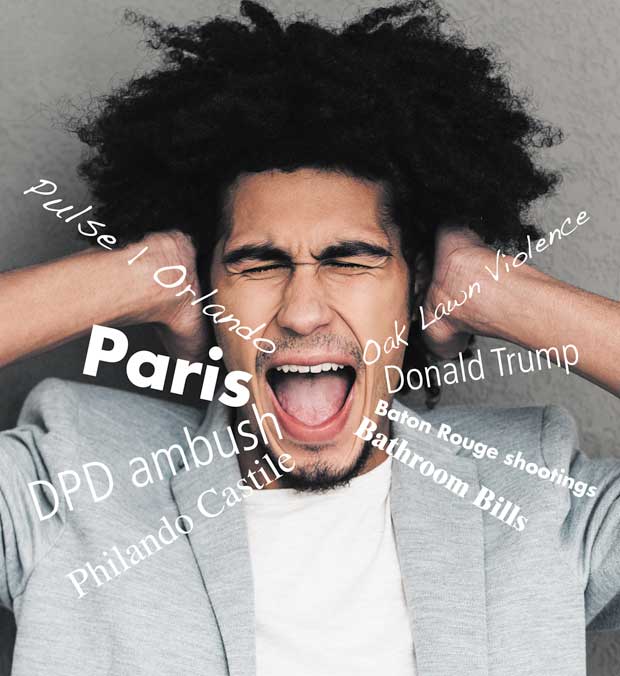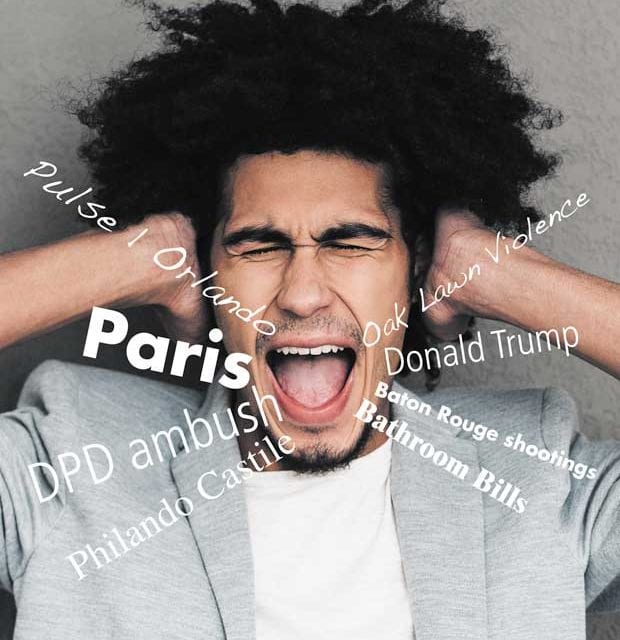Violence, hateful rhetoric are creating a kind of post-traumatic stress among LGBT people

Tammye Nash | Managing Editor
Local counselor Dennis Hartzog, M.Ed, LPC, says that it isn’t unusual for clients who survived the early days of the AIDS epidemic to come to him suffering the classic symptoms of post traumatic stress disoder.
“These are people who survived from that first generation of AIDS, the people who were around at the height of the epidemic, the time before the miracle drugs were available,” Hartzog explained. “During that whole time, and even now, they never felt safe.
“Even though they were tested repeatedly and each time the tests came back negative, they never felt safe. They saw their friends die, their lovers die and they lived with the assumption that since they had done all the same things their friends had done, there was no way they could be negative,” he said. “They went to two or three funerals a week sometimes. They felt they couldn’t plan for a future, because their HIV negative status was no a home free card. They knew that status could change at any minute.”
Even now, Hartzog said, that fear persists. “I have clients who have lost two or three lovers to AIDS, and they still exhibit those same PTSD symptoms. They meet all the requirements for a PTSD diagnosis. They have good lives now, good careers, good relationships. They have homes and friends. They are financially comfortable. And yet, they are still afraid, still convinced something will come along to ruin it all.
“This isn’t about social anxiety,” he said. “It truly meets the definition of a traumatic stress disorder.”
In those older gay men, such stress, such worry are understandable. They lived through horrible times when someone could be young and healthy, with a bright future ahead of them one day, and a month or so later be at death’s doorstep. That’s not something you can just forget or get over.
But lately, Hartzog said, he is seeing that same stress, anxiety and panic, in much young lesbian and gay people (“I usually refer the transgender clients to Feleshia Porter [and Renee Baker],” local counselors who specialize in working with trans people, he said) who came of age or were even born after the advent of the HIV drug cocktails.
“In the past six months or more, it seems more and more [lesbian and gay] clients are coming in with some kind of panic disorder,” he said. “These are young people in their 20s and 30s with stable backgrounds suffering from a number of different anxiety disorders. I work mostly with LGBT clients and I would say recently, at least three of every five LGBT person whop comes through my door is dealing with some level of anxiety. It’s very, very unusual.”
But at the same time, given recent events and the extremely hateful rhetoric that has marked this election year, it isn’t really unexpected. Renee Baker, Ph.D.EE., LPC, agreed.
“It’s slowing down some this week,” she said Aug. 2. “But I have definitely had a lot of people coming in that needed to talk about the shooting in Orlando [at the Pulse nightclub] and the Dallas police shootings [from July 7, when five officers were killed following a peaceful Black Lives Matter rally].
“I have quite a few clients who’ve said they want to leave Texas,” Baker continued. “I have clients dealing with a great deal of fear, some to the point they can’t even leave their houses. Some are so afraid and every time they leave their home, they are wondering if they’ll come back home that night.”
Some, prompted by the injustice they see in the continuing onslaught of anti-transgender legislation — such as the so-called “bathroom bills” — and the ferociously hateful bent of GOP presidential candidate Donald Trump’s campaign, that they are “spurred into action,” Baker said.
Hartzog said that the panic disorders he is seeing seem to be particularly strong among gay men in their 20s and 30s, especially those who actually live in the Oak Lawn area. And it’s tied, he believes, to the still-unsolved rash of attacks on gay men there.
“They are coming in here and, just sitting in my office, they are sweating and trembling, experiencing chest pain and nausea. It’s getting to where they are afraid to leave their homes, afraid to be on the street after dark,” he said. “They think, ‘I need to go to Kroger so I’ll have something to eat for breakfast in the morning,’ and just the thought of it brings on those symptoms.
“I see people dealing with the symptoms of agoraphobia, symptoms that might be short term but that will, in some cases I think, develop into full-blown agoraphobia,” he said.
“And it’s not just in Oak Lawn. I am hearing similar stories from people in the Castro in San Francisco, Boystown in Chicago — all the gay neighborhoods. People just don’t feel safe anymore even in their own neighborhoods, their own clubs and bars.”
The virulent hatefulness of some politicians, Hartzog continued, can be especially stressful for LGBT people, who are often the specific targets of that hate.
“We’ve had to fight for our rights, rights heterosexuals take for granted. We’ve won a lot of battles, but we know that if our rights can be legislated into existence, then they can be legislated out of existence too, if the wrong people get elected,” he said. “We’ve seen a lot of progress, but we are afraid it will all be taken away from us.”
So the stress, the anxiety so many LGBT people are feeling these days is real, and it can be debilitating. But how do we fight it? How do we keep it from taking over our lives?
Start, Hartzog said, by recognizing where it comes from and by focusing instead on the best things in their lives, instead. In years past, while working with abused children, Hartzog said he learned that one way to deal with such anxiety and panic is to do a “gratitude list.”
“If you are laying there in bed and your mind is catastrophizing on what could happen, then get up, get a tablet and start writing down all the things you are grateful for — things that make you feel secure, like your job, being loved and accepted by the people that you love and who are important to you,” he said. “No, that won’t take away the fear. But it can
help you refocus and relax, and it will give you more confidence when you’re dealing with things that happen.”
Recognizing the stress, Baker said, and finding a way to deal with it, is votal.
“Recognizing stress is akin to recognizing that our behaviors and thoughts and feelings are all changing,” she said. “We are being pushed too far, and we can develop a variety of symptoms, such as sleep deprivation, muscle tension and depression and anxiety.”
Baker added, “Recognizing the change, being mindful of the change, allows us to find a healthy way to cope — connection to others, exercise, meditation, getting out in nature and so on. Unrecognized stress can lead to coping in unhealthy ways, such as overeating, alcohol and drug use, and isolation.”
And, Baker said, turn to friends and loved ones for help: “Asking for help from others when we want to the least, is often the best thing we can do.”
In other words, as the LGBT community continues to be targeted by hate and violence, as the stress and anxiety threaten to tear the community apart, that’s exactly when coming together as a community becomes even more important than ever.
This article appeared in the Dallas Voice print edition August 5, 2016.
















